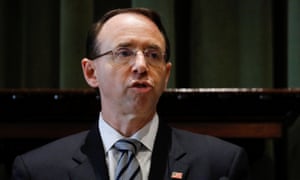Donald Trump escalated an increasingly cutthroat fight with the justice department on Friday, with a series of tweets accusing federal agents of infiltrating his 2016 presidential campaign “for political purposes” and to “frame” him for crimes he “didn’t commit”.
The president was echoed on television by the former New York City mayor Rudy Giuliani, his lawyer, who said Trump’s accusations “may turn out to be closer to the truth than people thought”.
“For a long time we’ve been told that there was some kind of infiltration,” Giuliani told CNN. “I don’t know for sure, nor does the president, if there really was one.”
If the accusations seemed strangely backwards-looking, given Trump’s election victory, they dovetailed with an ongoing campaign by congressional Republicans to impugn the special counsel, Robert Mueller, and telegraphed the president’s increasing determination to turn the page on the investigation into Russian election interference and alleged links between Trump aides and Moscow.
Former justice department officials warned that that determination was increasingly reckless. “When you’re out of cover ups to hide your guilt, you attack the legitimacy of the investigation,” tweeted former federal prosecutor Joyce Vance.
The Mueller investigation received a potential boost on Thursday with the announcement that the former son-in-law of former Trump campaign chairman Paul Manafort was cooperating with federal investigators. Prosecutors appear to be seeking the cooperation of Manafort, who has pleaded not guilty to multiple federal felonies, in the investigation of the Trump campaign.
With Mueller’s every advance, Trump and his proxies have increased the volume of their declarations that he has gone too far.
“I would like to see it get wrapped up,” the retiring House speaker Paul Ryan said on Thursday, of the Mueller inquiry. He added: “It’s been a year.”
Giuliani claimed on CNN that Mueller had agreed to narrow the scope of a potential interview with Trump, which has been under negotiation for months, from five topics to two.
“The main focus we want is Russia,” Giuliani said, seeking to foreclose an apparently central area of Mueller’s inquiry, potential obstruction of justice by Trump.
The most potent line of attack, however, may be the one Trump pursued on Friday: that the FBI had infiltrated his presidential campaign.
The Washington Post reported earlier this month that a “top-secret, longtime intelligence source” provided information to the FBI about the Trump campaign and Russia. The status of the source in relation to the campaign was unclear.
Whatever the unlikely merits of the “infiltration” charge – in March 2017, Trump falsely accused Barack Obama of undertaking “to tapp [sic] my phones during the very sacred election process” – the charge itself adds to pressure on the justice department to explain the FBI investigation of the Trump campaign.
Republicans in Congress led by the House intelligence committee chairman, Devin Nunes, have demanded the department release documents laying out the origins of the FBI inquiry.

Rod Rosenstein, the deputy attorney general overseeing the Mueller investigation, has fiercely resisted, warning earlier this month that “the justice department is not going to be extorted”.
On Thursday, the department complied with a federal judge’s order to hand over a sealed August 2017 memo written by Rosenstein that outlined Mueller’s purview.
A showdown over any such documents that led to Rosenstein being sidelined of ejected could be more damaging to the Mueller investigation than the removal of Mueller himself, former FBI special agent Asha Rangappa and others have written.
“Removing Rosenstein and replacing him with a deputy attorney general who is at the very least more sympathetic to Trump could have drastic repercussions for the investigation,” Rangappa wrote last December.
“This explains why the GOP is pushing hard to release Rosenstein’s memo granting authority to Mueller, in violation of DOJ policy,” former federal prosecutor Renato Mariotti tweeted on Friday.
“But it’s hard to believe this will actually lead to Rosenstein’s resignation. He had to know his memo would be highly scrutinized when he wrote it.”